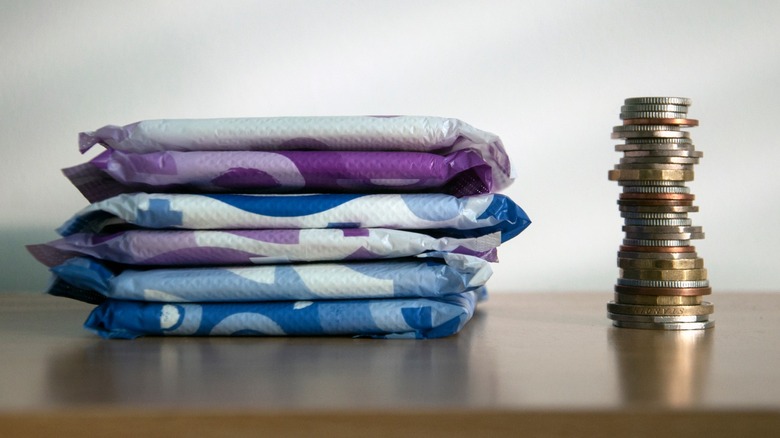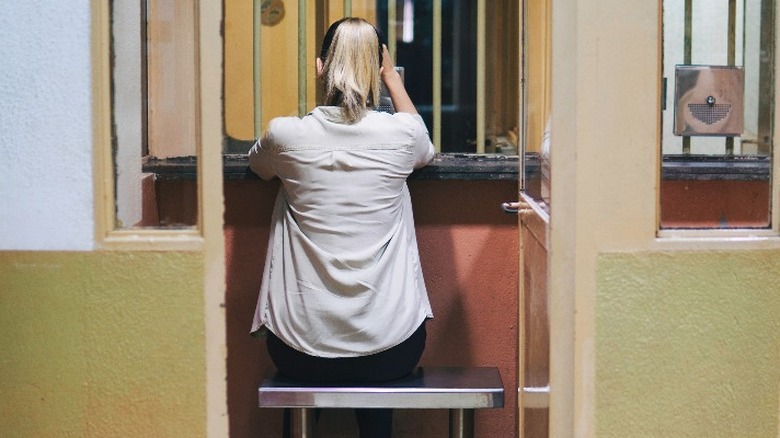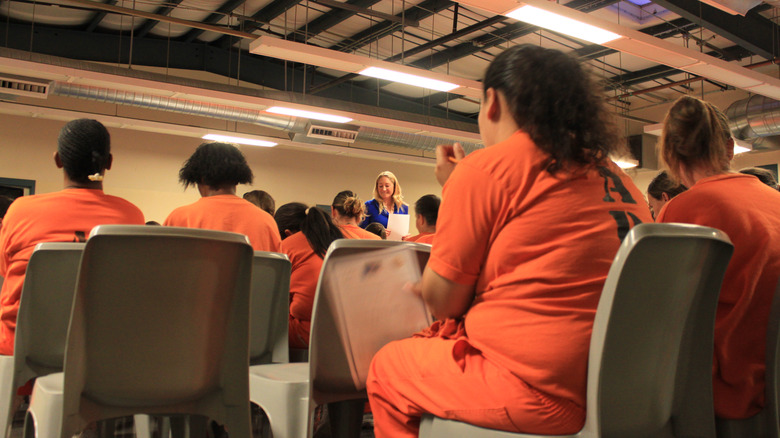Menstrual Inequity In Prisons Is The Weaponization Of Reproductive Health We Can't Ignore
While providing period products for incarcerated women might seem like a given, this isn't the case in United States prisons. Although a federal law, the First Step Act, mandates that the federal Bureau of Prisons provide tampons and pads to prisoners who menstruate in both an amount that meets the needs of each prisoner at no cost, stories from women demonstrate this law isn't being upheld inside the walls of America's correctional facilities. Some women have shared horrifying accounts of having to beg for sanitary products, and going as far as to divide and ration pads between fellow cellmates. The better menstrual products are sometimes kept in commissary — meaning women have to pay for them at the expense of other hard-earned necessities.
Among the frequently shocking anecdotal accounts that detail what happens when incarcerated people do not have access to proper menstrual care, each has one thing in common. Women's periods are exploited within prison as a means of control — one that goes even beyond subjugation, toward dehumanization.
Menstruating inmates are vulnerable to those in power
The discussion around menstrual inequity in prisons isn't just about convenience. The overall effect of denying people access to period products can be dehumanizing, deeply humiliating, dangerous, and potentially life-threatening. For one, the ACLU notes that hygiene becomes a critical concern. Due to the lack of available pads and tampons, some incarcerated people have attempted to fashion period products out of sheets or cloth, which can both pose health and legal risks — materials appropriated could be considered damaged property. It's also been reported that many incarcerated women wear bloodied clothes and sleep on bloody sheets when they cannot access menstrual products. The combination of these unsanitary conditions along with using makeshift products increases the risk of infection such as the human papillomavirus, or HPV, in turn requiring those same inmates to seek medical care that can also be difficult to access while incarcerated.
The inhumane conditions have made menstruating inmates particularly vulnerable targets to those in power, like prison guards. Because they have total control over the supply of menstrual products, they have the power to limit access, and therefor, control a menstruating inmate's experience by their own rules. Research from Texas A&M University revealed guards at some prisons in the US play favoritism toward specific inmates, while treating others poorly. In 2014, one federal investigation found an Alabama correctional officer withheld giving inmates menstrual products unless they exchanged sexual favors. In other words, it creates a total weaponization of period products in order to maintain control over menstruating inmate's bodies.
Addressing menstrual inequality isn't happening fast enough
Having access to proper menstrual care should be considered a human right whether or not someone is in prison, as it is deeply connected to human dignity. Even though the Eighth Amendment requires that prisoners live in humane and hygienic conditions, the ACLU notes that judges have often dismissed concerns as insignificant. The nonprofit suggests advocating for accountability within prisons to support legislation that would see greater access to menstrual products in both correctional facilities and other institutions including housing shelters and schools, and to engage with local support groups fighting to provide menstrual products for those who do not have proper access to them.
The Menstrual Equality for All Act was introduced by New York Democratic Congresswoman Grace Meng in 2021, which would ensure that all detainees, including those in state facilities, would have access to menstrual products, as well as mandate guidance on allocating them — among expansive other provisions. "Period products are necessary and essential items for anyone who menstruates, and access to these items are a health care and human right," Meng said in a press release. However, as of this writing, the bill is still being reviewed by various subcommittees. Everyone who menstruates cannot and should not wait to receive the care they need while imprisoned or jailed.


